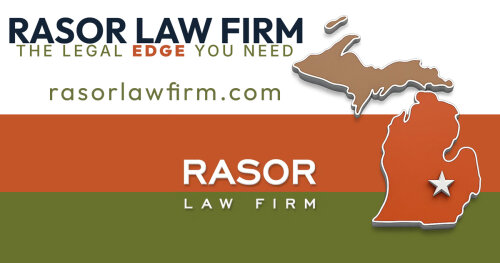Best Assault & Battery Lawyers in Maryland
Share your needs with us, get contacted by law firms.
Free. Takes 2 min.
Or refine your search by selecting a city:
List of the best lawyers in Maryland, United States
About Assault & Battery Law in Maryland, United States
Assault and battery are serious criminal offenses in Maryland. The term "assault" generally refers to the threat of causing harm to another person, while "battery" traditionally means actual physical contact or harm. However, under Maryland law, both terms are combined and addressed under the umbrella of "assault." There are different degrees of assault based on the severity of the act, whether weapons were involved, and whether the alleged victim sustained injury. Convictions for assault can result in significant criminal penalties, including jail time, fines, probation, and lasting repercussions on your legal record.
Why You May Need a Lawyer
Facing an assault or battery charge in Maryland is a serious matter that often requires skilled legal representation. Here are some common situations where you might need a lawyer:
- You have been accused of assault or battery and face criminal prosecution.
- You are a victim of assault and want to press charges or seek a protective order.
- Your case involves complex circumstances, such as self-defense claims or mutual altercations.
- You are facing additional related charges, such as domestic violence or weapons offenses.
- You wish to negotiate a plea deal or seek to have charges reduced or dismissed.
- You need representation for a court hearing, trial, or to navigate the criminal justice process.
- You are concerned about the impact of a conviction on your employment, immigration status, or professional licenses.
Local Laws Overview
Maryland law treats assault as an offense against a person. There are several key aspects of local laws relevant to assault and battery:
- Assault in the First Degree: This is the most serious form, including causing or attempting to cause serious physical injury or using a firearm. It is a felony and carries up to 25 years in prison.
- Assault in the Second Degree: This involves lesser physical injury or the threat of harm. This can be a misdemeanor or felony, depending on the circumstances, and typically carries up to 10 years in jail and a possible fine.
- Defenses: Common legal defenses in Maryland include self-defense, defense of others, lack of intent, and consent.
- Protective Orders: Victims of assault may seek civil court protective orders to prevent ongoing contact or abuse.
- Additional Consequences: Convictions can have impacts beyond criminal penalties, including restraining orders, loss of certain rights, and implications for background checks.
- Juvenile Offenders: Special considerations apply if the accused is under 18, with separate juvenile laws and procedures.
Frequently Asked Questions
What is the difference between assault and battery in Maryland?
Maryland law combines both assault and battery under the term "assault." Any unwanted physical contact or the threat of imminent harm can result in assault charges, with varying degrees based on severity.
Is assault always a felony in Maryland?
No, not all assault charges are felonies. First degree assault is a felony, while second degree assault can be charged as either a misdemeanor or felony depending on the facts of the case.
Can I go to jail for a second degree assault conviction?
Yes. Second degree assault in Maryland carries a potential penalty of up to 10 years in jail and a fine, even though it is often charged as a misdemeanor.
What should I do if I am accused of assault?
Do not discuss the incident with anyone except your attorney. Seek legal representation immediately and follow your lawyer's advice regarding statements to law enforcement and court procedures.
Can self-defense be used as a defense in assault cases?
Yes. Self-defense is a commonly used defense in assault cases. You must show that you reasonably believed you were in danger and used no more force than necessary.
What if both parties were fighting?
When both parties are involved in a physical altercation, the court may consider mutual affray. Legal counsel can help determine potential defenses or shared culpability in these situations.
Can a victim drop assault charges?
The decision to prosecute lies with the State's Attorney, not the victim. However, a victim's wishes often influence the outcome, and a prosecutor may decide whether or not to pursue charges.
How does a criminal charge impact my record?
A conviction or even a charge can appear on your criminal record, affecting employment, housing, and other aspects of your life. Expungement may be possible under certain circumstances; consult a lawyer for guidance.
Are there special considerations for domestic assault cases?
Yes. Cases involving family or household members can result in additional charges or protective orders. Courts treat these cases with heightened seriousness, and mandatory arrest policies may apply.
How do protective orders work in Maryland?
Victims can request protective orders which may restrict contact, grant temporary custody of children, or provide other protections. Violating a protective order is a separate criminal offense.
Additional Resources
If you need more information or assistance regarding assault and battery in Maryland, consider reaching out to the following resources:
- Maryland Judiciary: Offers information on court processes and protective orders.
- Maryland Volunteer Lawyers Service: Provides free and low-cost legal assistance to those who qualify.
- Maryland Office of the Public Defender: Represents individuals facing criminal charges who cannot afford private counsel.
- Maryland State Bar Association: Can help you find qualified attorneys for your case.
- Local law enforcement agencies: Can provide guidance on filing reports or seeking immediate protection.
- Domestic Violence Hotlines: For those in immediate danger or seeking confidential support related to assault.
Next Steps
If you are facing an assault or battery issue in Maryland, here is what you should do next:
- Do not attempt to handle the matter alone or make statements to police without consulting an attorney.
- Gather any relevant evidence, such as photographs, witness information, or medical records.
- Contact a qualified criminal defense attorney or, if you are a victim, an advocacy organization or legal aid group.
- Attend all scheduled court appearances and follow your lawyer's advice closely.
- Familiarize yourself with your rights and potential outcomes early in the process.
- Consider your options, such as plea bargaining or seeking diversion programs, if eligible.
- Seek support from counseling or advocacy services if needed, especially in domestic or sensitive cases.
Finding the right legal assistance promptly can make a significant difference in the outcome of your case. Do not wait to seek help if you are involved in or affected by assault and battery issues in Maryland.
Lawzana helps you find the best lawyers and law firms in Maryland through a curated and pre-screened list of qualified legal professionals. Our platform offers rankings and detailed profiles of attorneys and law firms, allowing you to compare based on practice areas, including Assault & Battery, experience, and client feedback.
Each profile includes a description of the firm's areas of practice, client reviews, team members and partners, year of establishment, spoken languages, office locations, contact information, social media presence, and any published articles or resources. Most firms on our platform speak English and are experienced in both local and international legal matters.
Get a quote from top-rated law firms in Maryland, United States — quickly, securely, and without unnecessary hassle.
Disclaimer:
The information provided on this page is for general informational purposes only and does not constitute legal advice. While we strive to ensure the accuracy and relevance of the content, legal information may change over time, and interpretations of the law can vary. You should always consult with a qualified legal professional for advice specific to your situation.
We disclaim all liability for actions taken or not taken based on the content of this page. If you believe any information is incorrect or outdated, please contact us, and we will review and update it where appropriate.
Browse assault & battery law firms by city in Maryland
Refine your search by selecting a city.















